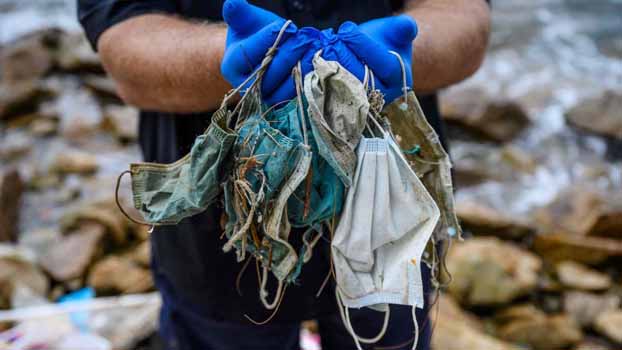Covid wastes pose grave perils

Used masks, gloves and other personal protective equipment (ppe) posed the risk of catching coronavirus infection as more than 90 percent of these medical wastes are not being disposed in proper way.
As these wastes contain potential risk of causing infection, immediate measures are indispensable to prevent the spread of the rogue virus ahead of the winter, experts say.
Experts caution that such used masks, gloves and ppe, if not properly disposed, will fuel the transmission of Covid-19 during the winter as the second wave of the deadly disease is now sweeping the world.
On May 30, the government made it mandatory to use masks when one stays home outside home, in order to prevent the virus infection.
Health workers are using PPE including masks, gloves, face shields and gowns at different government and private hospitals. After use, all this becomes covid-waste.
Although Directorate General of Health Services (DGHS) and Department of Environment (DoE) issued guidelines and public notice for the management of Covid-19 waste at residence and medical centres, it has not been implemented across the country.
According to a recent study conducted by BRAC, only 6.6 percent of healthcare and medical wastes were properly managed during the Covid-19 epidemic. The remaining 93 percent wastes are lying around us.
The study found that around 248 tonnes of waste are being produced every day from different medical centres and hospitals across the country. Only 35 tonnes out of this are being disposed in a proper way.
Around 71 percent of people are using masks and other healthcare products. Their masks and other corona wastes are being completely mixed with household wastes.
Public health expert Dr Lelin Chowdhury told the Bangladesh Post, “If medical wastes are not treated properly, germs and virus can enter the food cycle through soil and water. This could lead to catastrophic disasters.”
“Corona waste is more contagious than any other medical waste. So, it is very risky to leave these wastes here and there or not to treat them properly,” he added.
According to another study of Environment and Social Development Organization (ESDO), the country has produced 14,000 tonnes of plastic waste from March 26 to April 25, of which only gloves were 5,877 tonnes.
It is known that Prism Bangladesh is the only non-government organisation, involved in medical waste management.
Before Covid-19 pandemic, they were working in coordination with two city corporations in Dhaka to collect wastes from various hospitals and houses.
During the pandemic, the quantity of covid-19 waste increased a lot. On the other hand, they do not collect from all hospitals.
Prism Bangladesh is working with only 27 public and private hospitals in Dhaka. They collect around 2000 kg medical wastes per day from these hospitals.
After collecting the wastes, they take it to the Medical Waste Management Plant at Matuail via specialised covered vans. Then the waste is disposed of by burning into incinerators at high temperatures (1200-1500 degree Celsius).
Meanwhile, returning home from outside, people are throwing their used masks in the kitchen trash cans.
Talking to cleaners of two city corporations in Dhaka, it has been learnt that they are getting masks and gloves with household wastes from almost all the houses.
Medicine and infectious disease specialist of Dhaka Medical College Hospital Farhad Uddin Hasan Chowdhury Maruf said, “It is extremely risky to throw masks and gloves on the road after using them or not to dispose them properly.”
He also said, “Children are also collecting such waste from road. They are not in a position to follow the hygiene rules. They will also act as a source of covid-19 infection.”
About covid-19 waste management, Commodore M Saidur Rahman, chief waste management officer of Dhaka North City Corporation, said, “Every Saturday and Tuesday, our staff will bring the waste. Then they will keep it separate and later Prism Bangladesh will take it away.”
He said, “People are not aware. We have given instruction to keep covid and non-covid waste separately. But the problem is that no one in the house is keeping waste separately.”



